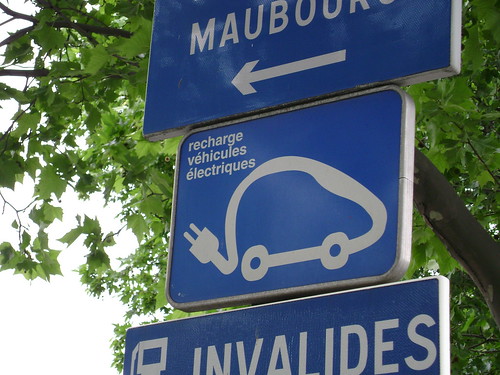February 8, 2014 at 12:06 pm
via Oregon Bicycle Transportation Alliance
If you ever hear someone say that bicyclists get a “free ride”, share this infograph below that explains why people on bikes not only pay more than their share of road costs, but save everyone money whenever they ride.

Image courtesy: btaoregon.org
March 10, 2009 at 12:29 pm
(Source: Bnet.com Auto)
When people use the word “tax” and the phrase “electric car” in the same sentence, they’re usually talking about the lucrative tax credits you can grab onto by buying one.
But there’s another way to look at the tax issue. Suppose, as many analysts are now concluding, the bulk of the car fleet shifts from gasoline to electric. Will we tax EV recharges the way we now tax gas (at 18.4 cents a gallon)? Dr. Lyle Dennis, whose website GM-Volt.com champions Chevrolet’s plug-in hybrid, asks, “Will they raise taxes on electric rates and make EV recharging more expensive? It’s an important question.”
It seems to make more sense to simply switch to a “vehicles miles traveled” tax that’s agnostic on how cars get around. Mileage could be tracked with GPS devices installed in cars. But that’s off the table for now. Transportation Secretary Ray LaHood said his department was studying the idea, but an Obama spokesman quickly denied it is now or ever will be U.S. policy.
Click here to read th eentire article.
February 27, 2009 at 11:31 am
(via Editorial – A Smart Way to Help Commuters – NYTimes.com)
It’s been clear for months that only Albany could really rescue New York City commuters from the drastic service cuts and major increases in tolls and fares threatened by the deficit-ridden Metropolitan Transportation Authority.
That seemed a hopeless prospect — until this week, when Assembly Speaker Sheldon Silver, Albany’s most powerful Democrat, announced a compromise plan that could help both the authority and its riders. What is even more encouraging, Mr. Silver is probably the only one in Albany with enough clout to sell such a compromise.
The Silver plan is adapted in part from an excellent proposal outlined last year by Richard Ravitch, the authority’s former chairman. Mr. Ravitch and a commission established to find new ways to finance mass transit proposed two changes: a modest payroll tax for employers in a 12-county area and new tolls on bridges to Manhattan along the Harlem and East Rivers.
Click here to read the entire article.
February 27, 2009 at 12:22 am
(Source: etrucker.com)
The American Trucking Associations this week opposed a federal recommendation for a vehicle miles traveled tax, saying it presents privacy concerns.
ATA’s comments come in response to the National Surface Transportation Infrastructure Financing Commission’s report on highway funding challenges. The commission anticipates increasing problems with relying on fuel taxes to support infrastructure improvements because of increasing strides in fuel efficiency.
The commission’s solution – to migrate to a vehicle miles traveled tax – presents privacy concerns that not only are intrusive, but also could lead to new forms of fraud and identity theft, ATA argues. Also, the costs to implement and maintain the program would reduce the amount of funds available for infrastructure, ATA says.
Click here to read the entire article.



